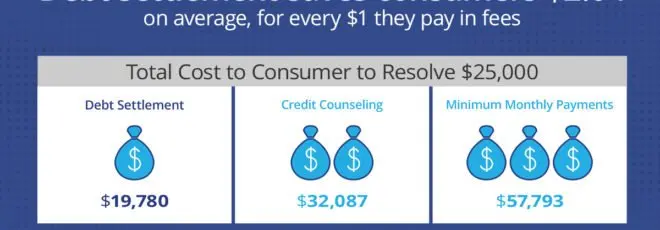The Case for Debt Settlement: The AFCC Study

- Debt settlement occurs when a creditor accepts less than the full amount owed as payment in full.
- An AFCC study found that debt settlement saved consumers an average of $2.64 for every $1 paid in fees.
- Debt settlement can save many consumers more than credit counseling, debt management plans, or debt consolidation.
Table of Contents
Many Americans are struggling with debt. In fact, the average credit card debt per borrower is over $6,000. And if you add student debt and mortgages to that, the numbers balloon considerably. It’s no wonder so many people aren’t able to keep up with their payments, let alone pay off their debt for good.
At Freedom Debt Relief, we firmly believe that debt settlement can change people’s lives for the better—and we’re not the only ones. A study commissioned by the American Fair Credit Council (AFCC) shows how debt settlement can be an effective solution for people struggling with significant amounts of debt. Read on to learn more about debt settlement and why it can be such a useful debt relief tool for so many people.
What is debt settlement?
First, it helps to understand how debt settlement works. In debt settlement, a professional negotiates with your creditor or creditors to reduce the amount you owe them. Usually, the only type of debt eligible for debt settlement is unsecured debt, like personal loans, credit cards, medical debt, department store charge cards, and some private student loans.
When you hire a debt settlement company, you usually stop making payments to your creditor, and instead build up savings in a special account. In the meantime, the company creates and implements a negotiation strategy based on your debt situation. You pay a fee for the negotiation services, which is usually a percentage of the total amount of debt enrolled in the program.
Debt settlement study: key takeaways
The AFCC study found that for the majority of consumers who enroll, the debt settlement program dramatically improved their balance sheets and financial health. The key takeaways from the study included these findings:
Debt settlement saves consumers an average of $2.64 for every $1 paid in fees.
95% of debt settlement clients receive savings in excess of fees.
Most clients see initial account settlements within 4-6 months of starting the program.
Clients pay no fees until settlements are completed.
This analysis was based on a detailed statistical review commissioned by the AFCC, reflecting 400,000 clients in 2.9 million accounts enrolled in debt settlement programs during the period January 1, 2011 to March 31, 2017. The full report, prepared by Hemming Morse LLP on behalf of the AFCC, can be downloaded here.
Debt settlement vs. other debt relief options
The study also compared debt settlement programs to alternative debt strategies, namely credit counseling, consolidation loans, bankruptcy, and making minimum payments. The main conclusions with regard to these were as follows:
Credit counseling: This approach involves a debt management plan that includes a reduced interest rate. However, this may not be available to those in serious financial hardship, and a reduction in interest is probably not as useful to this group of people as a reduction in principle.
Consolidation loans: These are often not available to clients who are already overextended in terms of credit. In addition, they can carry extremely high interest rates and expensive penalties.
Bankruptcy: Chapter 13 bankruptcy allows consumers to establish a repayment plan for their debt, but these plans have a failure rate of approximately 67%. Additionally, there are usually significant upfront, non-refundable costs like attorney and filing fees.
Minimum payments: Many people try to make minimum payments on their debt until it’s paid off. However, this can take decades and cost consumers significant amounts of money in interest.
Even with fees accounted for, a debt settlement company can save consumers a lot of time and money compared to common alternatives.
What about taxes?
Some people criticize the debt settlement strategy because of its consequences with regard to taxes. This is due to the fact that when your principle balance is successfully negotiated to a lower amount, it’s called “debt forgiveness” or “discharge of indebtedness,” and the amount of that discharged debt can be considered taxable income. However, as the study points out, the IRS also allows those who can demonstrate insolvency to exclude those “gains” from their taxable income. So in some situations, it’s possible that enrolling in a debt settlement program won’t actually affect your taxes at all, but you need to talk to a professional tax preparer to be sure.
Can debt settlement help you?
While a debt settlement program isn’t for everyone, it can help save money for people who enroll and stick with their program. If you’re struggling with debt or worried about falling behind on payments, it might be time to take action. Freedom Debt Relief is here to help you understand your options for dealing with your debt, including our debt settlement program. Our Certified Debt Consultants can help you find a solution that will put you on the path to a better financial future. Find out if you qualify right now.
Learn More
How to Pay Off Debt (Freedom Debt Relief)
Debt Relief FAQs (Freedom Debt Relief)
Why You Should Never Make Just the Minimum Payment on a Credit Card (Forbes)
5 Things that Affect Your Credit Score — Plus 6 Things that Don’t (Business Insider)